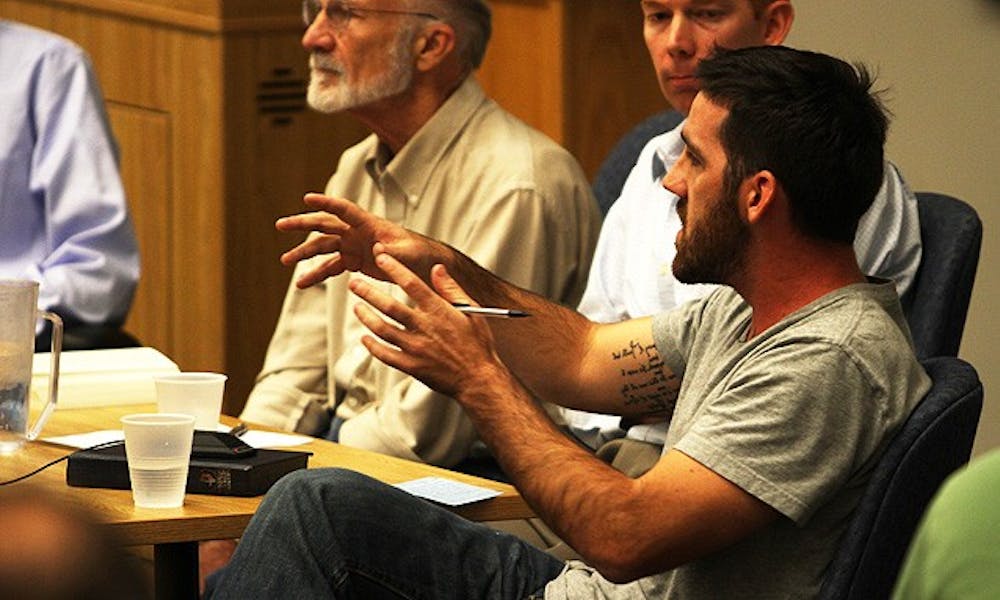Duke should be a place where a student veteran feels safe to talk their about their wartime experiences, Duke student and Iraq War veteran Logan Mehl-Laituri said.
Several veterans and faculty members discussed the impact of war on soldiers’ lives and the issue of their reintegration into American society at an event titled “Narrating War at Duke,” Tuesday. The discussion was particularly timely given President Barack Obama’s announcement Friday that the U.S. will withdraw all of it forces in Iraq by the year’s end. Two student veterans—Mehl-Laituri, who was honorably discharged from the U.S. Army in 2006, and Andrew Bell, a first-year doctoral candidate in political science and former intelligence officer with the U.S. Air Force in Afghanistan—shared their struggles to interact and the silence that sometimes befalls soldiers returning from war.
“I could not share with people my experience of my six years in the Army,” said Mehl-Laituri, a second-year Master of Theological Studies candidate. “As much as military marks a difference, we should not make that a difference we cannot overcome. The task for the University, the church and the wider world is to create something like confession.”
The panel was hosted by Milites Christi, a student-run organization of the Duke Divinity School dedicated to engaging conversations between the armed forces, veterans and the church. Stanley Hauerwas, Gilbert T. Rowe professor of theological ethics, and Dr. Warren Kinghorn, director of psychiatric emergency care at the Durham Veterans Affairs Medical Center and consulting associate at the Duke University Medical Center, also contributed to the discussion.
“The experience of war is not just a job, it’s a particular kind of moral and personal education,” said Kinghorn, also assistant professor of psychiatry and pastoral and moral theology and Divinity ’11. “Soldiers are trained not just to do a job but to become certain kinds of people.”
Kinghorn said veterans must speak out about the experience of war in places because such discussions push people out of their comfort zone, encouraging them to see a new perspective.
“The church and this divinity school need to listen openly to people in the military,” he said.
Hauerwas discussed the many mental sacrifices soldiers make while serving their country, especially in behaviors otherwise unnatural to many Christian soldiers.
“The greatest sacrifice we ask of people who go to war is the sacrifice of their normal unwillingness to kill,” Hauerwas said. “For most, it is the most decisive and transformative experience they’ll ever have, and it makes everything we do in the church seem trivial.”
Bell noted the toll of violence on his perception of humanity in Afghanistan.
“After a while, you stop seeing people as people and you start seeing them as targets, and you think of this whole thing as hunting—hunting for targets,” he said. “Even though we were in this mode of wanting to kill our targets, we didn’t want to kill the wrong guys. There was this element of humanity.”
The church—especially its leaders—need to make an effort to include veterans and members of the military in their communities, Hauerwas said.
Also during the panel, Bell displayed some pictures of his friends and others that he met during his time in Afghanistan.
“These guys, they are 17, 18, 19-years-old, and they put their moral development in jeopardy, sacrificed their moral education for what the country had asked them to do,” he said. “They are straight out of high school, and they are going to do something that is going to influence all of their following life.”
Elizabeth Queen, a first-year Master of Divinity candidate, said she found this topic to be important, adding that she would like to see more discussions like this.
“It is interesting to talk about war—there are veterans all around us, and it is important to increase visibility,” Queen said.
Laura Levens, a fifth-year theology doctoral candidate, said she related very well to Tuesday’s panel because it evoked memories of her friends and family who are members of the military.
“The theme of moral trauma was very interesting,” Levens said. “We always think of physical and emotional sacrifice but never of the moral sacrifice.... This is just the tip of the iceberg, we haven’t started discussing the sacrifices of the families and everyone else in these soldiers’ lives.”
Get The Chronicle straight to your inbox
Signup for our weekly newsletter. Cancel at any time.

